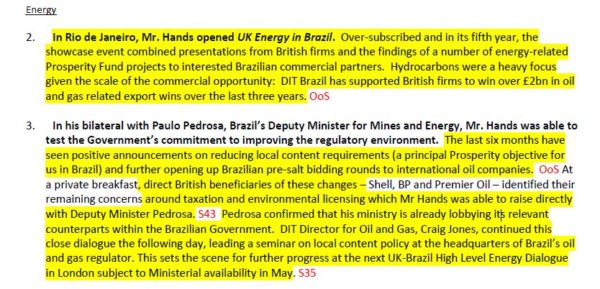UK oil lobbying revelations spark political row in Brazil
News that UK trade minister Greg Hands spoke to Brazilian officials on behalf of Shell and BP has caused controversy

An attempt by Liam Fox’s Department for International Trade (DIT) to lobby on behalf of Shell and BP while the companies looked to secure lucrative oil blocks off the coast of Brazil has led to a major political controversy in the country.
The political furore was triggered by a diplomatic telegram obtained by Unearthed under Freedom of Information rules and published last week.
It revealed that UK trade minister Greg Hands “directly” raised the oil companies’ concerns about tax and environmental licensing with Brazil’s deputy minister for mines and energy, Paulo Pedrosa.
The document also showed that the British government welcomed a move by the Temer administration to relax rules requiring foreign companies to use local firms, describing it as a “principal Prosperity objective for us in Brazil”.
After Hands’ visit to Brazil back in March, President Temer’s government went on to make a proposal for up to $300bn in tax relief to companies that develop offshore oil and gas in the country and BP and Shell both won licences to drill in the country’s controversial pre-salt region.
Congressman Edmilson Rodrigues from Brazil’s Socialism and Liberty party (PSOL) told Unearthed that the tax relief bill, titled MP 795/2017, could be brought to a vote in the Brazilian parliament later this week and opposition politicians are keen to block it.

Political fallout
Following the Unearthed revelation, Brazilian politicians from several parties have called for the country’s Attorney General to investigate the government’s dealings with the oil giants.
In a letter seen by Unearthed (in Portuguese) a group of 13 Senators and two congressmen, expressed concerns about the meeting with Hands and bemoaned the Temer government’s move to offer a huge tax break for oil companies looking to drill offshore.
The signatories fear that the moves will undermine efforts to use the massive oil reserves in the Atlantic Ocean to improve economic opportunities in the country.
In response to the revelations in the diplomatic cable, the politicians are asking prosecutors to investigate whether there may have been any breach of Brazilian law in the award of the “pre-salt” offshore oil blocks, or in the drafting of the tax-break bill.
Congressman Rodrigues (PSOL) told Unearthed that his party would look to block MP 795/2017 when it was brought to a vote.
He said the “pre-salt was already a huge conquest for international oil firms” and that a large part of the royalties from the oil blocks was “supposed to be invested in education”.
“They don’t want to pay taxes, or pay very little, much less than developed countries,” he added.
“They want to change environmental legislation to suit them and still not pay taxes.”
In the UK, the Freedom of Information Act gives the public access to information held by public bodies. That means things like government departments, local councils and universities are obliged to publish certain information about their activities, while members of the public can also make requests for information. You can find out almost anything with an FOI request, from how much money your university makes from library fines each year, to what government ministers are saying to powerful corporations. Find out more here.
Unredacted
DIT’s lobbying of the Brazilian government only came to light after officials accidentally sent an unredacted diplomatic telegram to Unearthed, following an FOI request.
The document, which has key sections highlighted in yellow instead of being blacked out, details a trip by Hands to Brazil in March.
It reveals that, at a “private breakfast” in Rio de Janeiro, Shell, BP and Premier Oil relayed their concerns “around taxation and environmental licensing” to the minister, who then raised them “directly” with Pedrosa.
The Brazilian minister then reportedly “confirmed that his ministry is already lobbying its relevant counterparts within the Brazilian government”.
The document also states that the UK government welcomed moves by the Brazilians to relax local content requirements and “open up Brazilian pre-salt bidding rounds to international oil companies”.
A huge climate issue
Shell was awarded three oil blocks to pump oil from the region on October 27th, the same day BP won two blocks.
It has been estimated that there could be as many as 176 billion of barrels of oil buried beneath thousands of feet of salt in the Atlantic ocean off the coast of Brazil.
But environmental campaigners have warned that drilling in the region could accelerate climate change and have urged the government to leave the oil in the ground.
The proposed tax breaks are designed to make the oil blocks appealing to international companies, with the Brazilian government reportedly keen to sell off the blocks as quickly as possible.
When asked to comment on the developments in Brazil, a spokesperson for the Department of International Trade reiterated the comments it made on Unearthed’s previous story, saying: “DIT is responsible for encouraging international investment opportunities for UK businesses, whilst respecting fully local and international environmental standards. The UK oil and gas industry and supply chain supports thousands of jobs and provides £19 billion in goods exports alone.
“However it is absolutely not true that our Ministers lobbied to loosen environmental restrictions in Brazil – the meeting was about improving the environmental licensing process, ensuring a level playing field for both domestic and foreign companies, and in particular helping to speed up the licensing process and make it more transparent, which in turn will protect environmental standards”.
The spokesman also highlighted remarks made by Greg Hands in the House of Commons last week, where the minister told MPs that he had made public at the time of his meeting with the Brazilian energy minister that the “basis of the meeting” was to “secure a level playing field for British companies in that market”.
Mr Hands added: “We make no apology for saying that Brazil’s tough environmental regulations should apply equally to all companies across the board.”
Additional reporting by Sam Cowie

